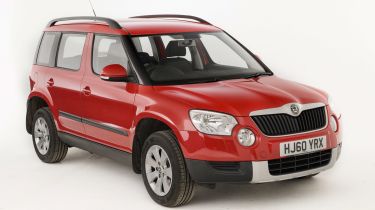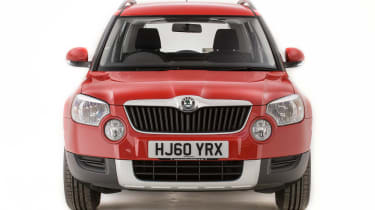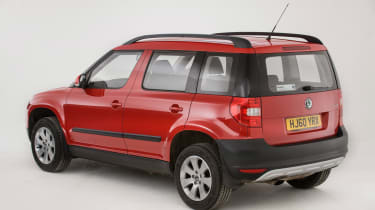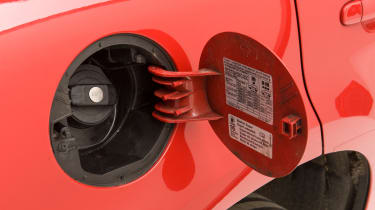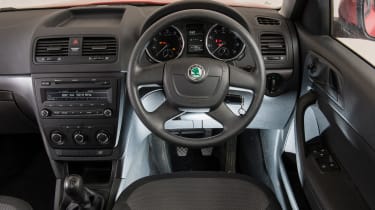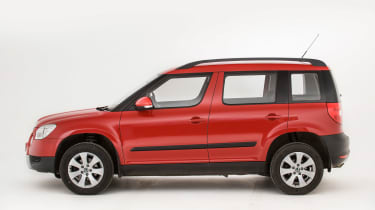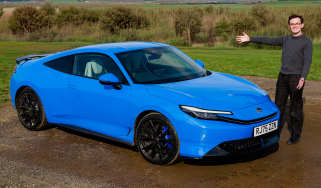Used Skoda Yeti review
A full used buyer’s guide on the Skoda Yeti covering the Yeti Mk 1 (2009-date)
We’ve run two Yetis on our fleet and they’ve been as popular as each other. Our first, a 1.2 TSI, notched up over 20,000 miles and didn’t put a foot wrong. The 1.6-litre diesel that followed was just as dependable. We also found the dealers to be excellent when servicing time came round. But what really impressed was the Yeti’s usability. A tough, versatile interior makes it one of the best family cars going, while economy is a strong suit, too. The Yeti isn’t just one of the best SUVs you can buy, it’s one of the best cars on sale, because it’s so talented.
When Skoda launched the Yeti in 2009 it joined an already large pool of compact SUVs, so it wasn’t exactly cutting edge. However, it still managed to cause a stir.
Here was a car that was good to drive, versatile and spacious, so while in theory it didn’t offer anything new, it actually moved things on in a class that was becoming increasingly popular with new car buyers.
So it’s no wonder that the Yeti was our Car of the Year in 2010, but that was just the start of the honours. Since then, this versatile family car has notched up awards for its off-roading and towing abilities, while Auto Express readers have consistently rated it one of the best cars on the market.
Models covered
Having arrived in the second half of 2009, the Skoda Yeti has proven to be an extremely popular compact SUV. Despite receiving a facelift in 2014, it’s still in its first generation so it’s this model that we’re focusing on here.
Used - available now

2025 Audi
A5 Sportback
69,573 milesAutomaticPetrol2.0L
Cash £19,397
2024 Volkswagen
T-Roc
51,000 milesManualDiesel2.0L
Cash £18,697
2020 Volkswagen
Golf GTE
62,927 milesAutomaticPetrol1.4L
Cash £13,697
2021 Citroen
C3 Aircross
11,882 milesAutomaticPetrol1.2L
Cash £13,497- Skoda Yeti (2009-date) - Award-winning SUV makes lots of sense second-hand
Skoda Yeti
Prices from £8,000
History
The Yeti arrived in September 2009, with 105bhp 1.2 TSI and 160bhp 1.8 TSI petrol engines or a 2.0 TDI diesel in 109, 138 or 168bhp forms. There were four trim levels (E, S, SE and Elegance). By August 2010 there was a 1.4 TSI option and three months later the eco-friendly GreenLine appeared, with a 1.6 TDI engine.
The 1.8 TSI, 2.0 TDI 140 and 2.0-litre TDI 170 engines came with four-wheel drive only, while the 1.2 TSI and 1.4 TSI were front-wheel drive. The 2.0 TDI 110 could be ordered with either configuration.
A facelift in January 2014 brought new equipment and a fresh interior, plus two variations: Yeti and Yeti Outdoor. The latter featured more rugged looks and was aimed at buyers keen to use their car off-road.
Skoda Yeti reviews
Skoda Yeti in-depth reviewSkoda Yeti 1.2 TSI reviewSkoda Yeti GreenLine 1.6 TDI reviewSkoda Yeti 2.0 TDI reviewSkoda Yeti Monte Carlo reviewSkoda Yeti Adventure reviewSkoda Yeti long-term test review
Which one should I buy?
All Yeti engines are strong, but the turbocharged units are especially zesty. The DSG semi-auto transmission isn’t as reliable as the manual alternative, but it’s still decent.
Four-wheel-drive Yetis are ideal if you’re towing. The entry-level Yeti E has electric front windows, electrically adjustable and heated door mirrors, remote central locking and air-conditioning. We’d go for at least an S, though, as these feature ESP, alloy wheels and electric rear windows. The SE also comes with rear parking sensors, cruise control, dual-zone air-con and privacy glass.
The range-topping Yeti Elegance has bi-xenon headlights, leather trim, heated front seats, automatic wipers and an auto-dimming rear view mirror.
Alternatives to the Skoda Yeti
The Nissan Qashqai is a tough adversary, with its smart looks, decent reliability and seven-seat option (in Qashqai +2 guise). It’s available in four-wheel-drive form, too – unlike another rival, the Peugeot 3008, which is still good to drive and well equipped.
The slightly smaller front-wheel-drive- only Citroen C3 Picasso features similarly boxy styling to the Yeti, and it’s practical. You can pick it up for a lot less money, but the Picasso is no off-roader. If four-wheel drive is key, check out the Ford Kuga, which is great value and dependable.
Otherwise, think about the Volkswagen Tiguan, Honda CR-V and Toyota RAV4 – they’re all credible contenders.
What to look for:
Fuel economy
Many owners are disappointed with their fuel economy – low-mileage examples can be thirsty, but tend to get frugal with age.
Park scrapes
Not all Yetis have rear parking sensors, and working out where the car’s extremities are is tricky, so scrapes aren’t unusual.
Glitches
Some cars – but not many – have suffered electronic glitches, especially where multimedia systems are concerned.
Spare wheel
There’s no spare wheel of any kind – just a tyre inflation kit. Full-size spare wheels are available from dealers at around £140.
Interior
Versatility is the name of the game here, as the rear seats slide individually backwards and forwards while the outer two can be moved inwards to create extra shoulder room. With everything in place there’s a 405-litre boot, but this can be expanded to an impressive 1,760 litres.
Running costs
All Yetis have variable servicing, with visits to the garage every two years or 20,000 miles, but it can be less. Services alternate between minor and major, which are priced at £139 and £259 respectively.
On top of these costs, the brake fluid has to be renewed after three years, then every two years (£49), and four-wheel-drive Yetis need fresh transmission oil every three years (£60). Diesel models will also need a replacement cambelt; this is required every four years or 120,000 miles on the 2.0 TDI and 140,000 miles on the 1.6 TDI. Expect to pay £359, or £459 with a water pump.
Recalls
The Yeti has been the subject of just one recall so far, issued in December 2011. Only Yetis with the commonrail (CR) 2.0 TDI engine were affected, with 1,867 vehicles caught up in the campaign – included in this figure were some contemporary Octavias and Superbs as well.
The recalled Yetis were built in 2009, 2010 and 2011. The problem was potential diesel leaks due to vibrations damaging high-pressure fuel pipes. This was solved by fitting a set of anti-vibration balance weights to the pipes.
Driver Power owner satisfaction
Having finished in the top two for the previous five years (winning three times between 2012 and 2014), the Yeti dropped to 16th in our 2016 Driver Power owner satisfaction survey. Its best result was 9th for ease of driving and 10th for build quality, while 76th for ride quality was the Yeti’s worst result.

